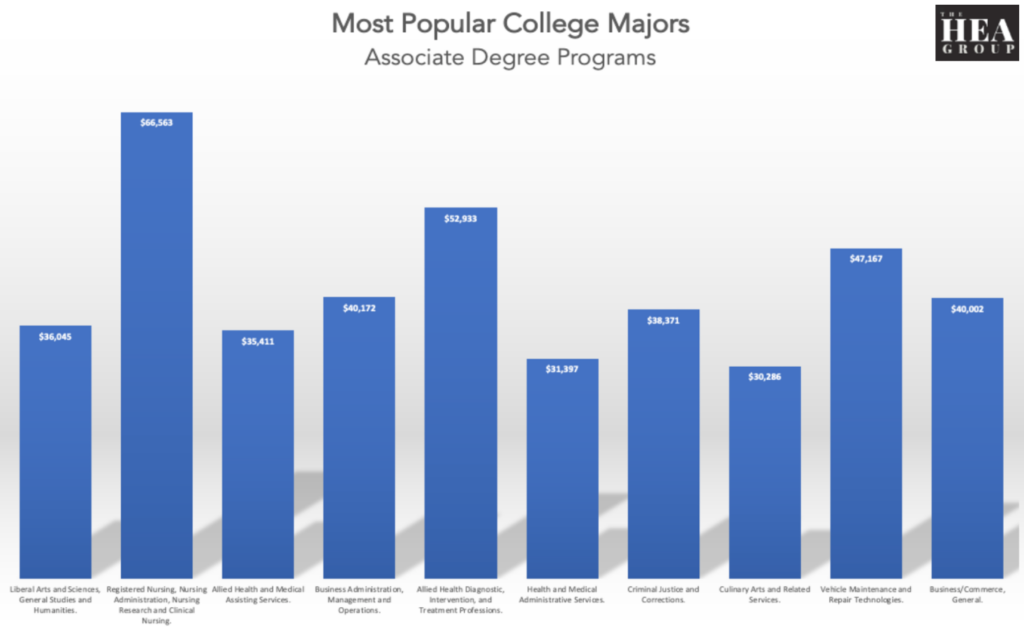If current trends continue, more than 2 million students will enter college in the fall as undergraduates. (Approximately 2.34 million freshmen entered last year.)
Another continuing trend? The rising cost of tuition — especially among private four-year colleges.
According to the Education Data Initiative, as of 2023, the average university student spent $37,641 in tuition and fees — and $54,501 per academic year total — on their college education.
Figuring out how to pay these high prices has practically become a national pastime, and more and more families are wrestling with the question: “Is college worth it?”
One solution to consider is to pursue a two-year associate degree instead of a four-year bachelor’s degree. Not only would you be spending half the time and money, but oftentimes, the tuition for two-year degrees is less expensive. An associate degree tends to cost an average of $3,621 per year, according to the National Center for Education Statistics.
In most cases, a bachelor’s degree will result in a higher salary than an associate degree ($57,000 versus $42,000, on average), but that’s not always the case. In fact, a recent study of earnings data by the HEA Group has found that in some cases, an associate degree might earn you more money than a four-year degree. It all depends on what you choose to study.
“With associate degrees, oftentimes the major matters more than the institution itself,” Michael Itzkowitz, the founder of the HEA Group told CBS MoneyWatch. “This shows that a college major is very important in terms of strict economic outcomes.”
According to HEA’s analysis, the STEM fields tend to command the highest salaries, even if you only receive a two-year degree. For example, if you earn an associate degree in physical science technologies, you will earn an average of $84,920 in the early years of your career, according to HEA’s study. Pursue an education in construction engineering technologies at the associate level, and you will earn an average salary of $72,496. And an associate degree in bioethics/medical ethics can lead to a salary of $77,157.
Meanwhile, a four-year stint to earn a bachelor’s degree in psychology will lead to a yearly salary of $43,409. And after four years of studying business administration, your estimated yearly salary will be $58,088. Pursue a bachelor’s degree in criminal justice and corrections, and you can look forward to an average annual salary of $47,809, according to HEA.
However, pursuing a STEM-related degree can cost more in general, whether you’re earning an associate degree or a bachelor’s. So even within the STEM fields, you have to choose carefully.
For example, according to the Education Data Initiative, if you pursue an associate degree in alternative and complementary medicine and medical systems, you’re likely to be saddled with an average of $38,530 in student loan debt. After just two years of schooling, that seems high.
They also found that students who pursue an associate degree in public health have more debt than those who pursue the same major at the bachelor’s level ($27,140 versus $23,110).
But are most students at the associate level trying to obtain degrees in these lucrative fields?
The HEA Group also ran the numbers on which associate degree programs were most popular, and they didn’t coincide with the most financially beneficial degrees. In other words, students are considering other factors as they choose their field of study.
Liberal arts and sciences, one of the most popular associate degree majors, is also one of the least lucrative in the early years of one’s career, with an average salary of $36,045. Culinary arts also made the list of the 10 most popular associate degree majors. Students’ average salary upon graduation is $30,286.
Of course, these data points don’t tell the whole story. A study by the Strada Education Foundation found that liberal arts and sciences majors “hit their stride later in their careers, experiencing rapid wage growth in their late 30s and early 40s — the fastest among majors.” The study also found that two out of five students who major in liberal arts go on to earn graduate degrees. This elevates their earnings to $76,000 annually, on average.
An interesting detail from the HEA Group’s report was the projected earnings of students who major in registered nursing, nursing administration, nursing research and clinical nursing. The HEA Group determined financial outcomes of these majors based on whether they receive an associate degree versus a bachelor’s degree. Nursing is a very popular major at both the associate and bachelor’s levels.
Nurses who earned a bachelor’s degree tend to emerge from their four years of education with an average of $22,590 in debt. They go on to earn a yearly salary of about $76,510.
Meanwhile, those who earned an associate degree in nursing accrued an average debt of $17,510 and went on to earn an average yearly salary of $64, 683.
So in this case, it seems prudent to go ahead and take on the extra $5,000 in debt. The salary earned from a bachelor’s degree is 14% higher, and will therefore make up for the extra educational investment in just a few years.












